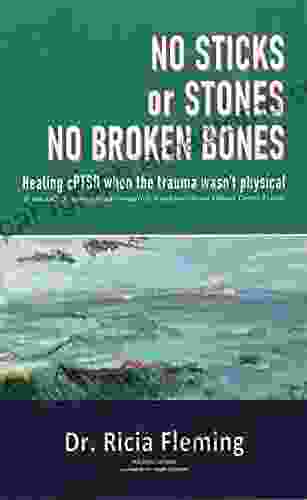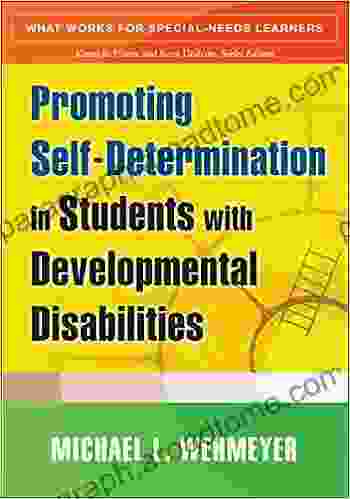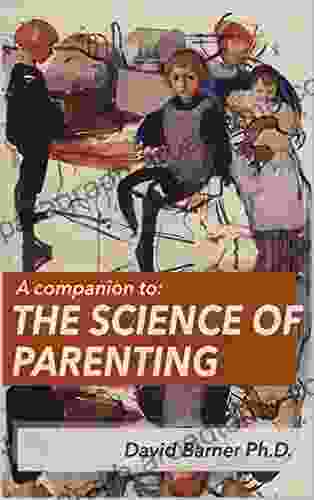Promoting Self-Determination in Students with Developmental Disabilities: An Essential Guide for Empowering Individuals

Self-determination is a fundamental human right that empowers individuals to make choices about their lives and to live with dignity and purpose. For students with developmental disabilities, self-determination is essential for their academic, social, and emotional growth. It allows them to develop a sense of agency, increase their independence, and actively participate in their own education and future planning.
This comprehensive guide provides educators, parents, and professionals with practical strategies and evidence-based approaches for fostering self-determination in students with developmental disabilities. By understanding the unique needs of these students and implementing effective interventions, we can empower them to reach their full potential and live fulfilling lives.
Self-determination is a complex concept that encompasses a range of skills and abilities, including:
4.5 out of 5
| Language | : | English |
| File size | : | 2524 KB |
| Text-to-Speech | : | Enabled |
| Word Wise | : | Enabled |
| Print length | : | 206 pages |
- Choice-making: The ability to make decisions and express preferences.
- Goal-setting: The ability to identify personal goals and develop strategies to achieve them.
- Self-advocacy: The ability to communicate needs and defend one's rights.
- Problem-solving: The ability to identify and solve problems independently.
- Self-evaluation: The ability to assess one's own progress and make necessary adjustments.
Fostering self-determination in students with developmental disabilities requires a holistic approach that addresses their individual needs and strengths. This can be achieved through a combination of educational, therapeutic, and community-based interventions.
Educational strategies that promote self-determination include:
- Providing opportunities for choice: Offering students choices in their learning activities, classroom routines, and daily schedules.
- Setting realistic goals: Collaborating with students to establish age-appropriate and achievable goals that align with their interests and abilities.
- Promoting self-advocacy: Encouraging students to express their thoughts, feelings, and needs, both verbally and non-verbally.
- Facilitating problem-solving: Providing students with opportunities to practice problem-solving skills in safe and supportive environments.
- Using assistive technology: Utilizing assistive devices and technologies to enhance students' communication, mobility, and access to learning materials.
Therapeutic strategies that promote self-determination include:
- Cognitive-behavioral therapy (CBT): A type of therapy that helps students identify and challenge negative thoughts and behaviors, and develop more adaptive coping mechanisms.
- Social skills training: Teaching students how to interact with others, build relationships, and assert themselves appropriately.
- Occupational therapy: Providing students with opportunities to engage in meaningful activities that enhance their sensory integration, motor skills, and overall well-being.
- Speech-language therapy: Working with students to improve their communication skills, including both verbal and non-verbal communication.
Community-based interventions that promote self-determination include:
- Supported decision-making: Providing students with individualized support to make informed decisions and express their wishes.
- Peer support programs: Facilitating opportunities for students to connect with peers who have similar experiences and share strategies for self-advocacy and problem-solving.
- Vocational training: Providing students with opportunities to develop job skills, explore career options, and prepare for the workforce.
- Independent living programs: Preparing students for the transition to adulthood by teaching them how to manage their finances, find housing, and access community resources.
Fostering self-determination in students with developmental disabilities requires a collaborative effort involving educators, parents, professionals, and the community. It is essential to create a supportive environment where students feel valued, respected, and encouraged to make choices.
Parents and families play a crucial role in supporting their child's self-determination. By providing opportunities for choice, encouraging self-advocacy, and setting realistic expectations, parents can empower their children to develop a sense of independence and self-direction.
Educators have a responsibility to create inclusive learning environments that promote self-determination for all students. They can do this by providing a range of learning experiences, encouraging student participation in decision-making, and providing individualized support.
Professionals, such as therapists, social workers, and vocational counselors, can provide specialized services to support students' self-determination. They can work with students to develop self-advocacy skills, problem-solving strategies, and transition plans.
The community can also play a vital role in supporting the self-determination of students with developmental disabilities. Community organizations, businesses, and service providers can offer opportunities for social participation, employment, and independent living.
Promoting self-determination in students with developmental disabilities is essential for their academic, social, and emotional growth. By understanding the unique needs of these students and implementing effective interventions, educators, parents, professionals, and the community can empower them to reach their full potential and live fulfilling lives.
This comprehensive guide provides a roadmap for fostering self-determination in students with developmental disabilities. By embracing the principles of choice, collaboration, and support, we can create a society where all individuals have the opportunity to live with dignity, purpose, and self-direction.
4.5 out of 5
| Language | : | English |
| File size | : | 2524 KB |
| Text-to-Speech | : | Enabled |
| Word Wise | : | Enabled |
| Print length | : | 206 pages |
Do you want to contribute by writing guest posts on this blog?
Please contact us and send us a resume of previous articles that you have written.
 Book
Book Novel
Novel Page
Page Chapter
Chapter Text
Text Story
Story Genre
Genre Reader
Reader Library
Library Paperback
Paperback E-book
E-book Magazine
Magazine Newspaper
Newspaper Paragraph
Paragraph Sentence
Sentence Bookmark
Bookmark Shelf
Shelf Glossary
Glossary Bibliography
Bibliography Foreword
Foreword Preface
Preface Synopsis
Synopsis Annotation
Annotation Footnote
Footnote Manuscript
Manuscript Scroll
Scroll Codex
Codex Tome
Tome Bestseller
Bestseller Classics
Classics Library card
Library card Narrative
Narrative Biography
Biography Autobiography
Autobiography Memoir
Memoir Reference
Reference Encyclopedia
Encyclopedia Joe Bageant
Joe Bageant Silvia Pala
Silvia Pala Jess Zafarris
Jess Zafarris Robert H Frank
Robert H Frank Joel Libava
Joel Libava Robin Sturtz
Robin Sturtz P T Stanley
P T Stanley John Mcarthur
John Mcarthur Kevin Strasser
Kevin Strasser Jerry Seinfeld
Jerry Seinfeld Joel L Parkyn
Joel L Parkyn Jocelyn Bell Burnell
Jocelyn Bell Burnell Michelle Mary Lelwica
Michelle Mary Lelwica Kipling D Williams
Kipling D Williams Mark Johnson
Mark Johnson Jin Chen
Jin Chen Joan Rothschild
Joan Rothschild Jenny Kern
Jenny Kern Jeremy Orozco
Jeremy Orozco Chris Hutchins
Chris Hutchins
Light bulbAdvertise smarter! Our strategic ad space ensures maximum exposure. Reserve your spot today!

 Jackson BlairUnveiling the Earth's Secrets: Introduction to Geological Maps and Structures
Jackson BlairUnveiling the Earth's Secrets: Introduction to Geological Maps and Structures
 Robert FrostUnleash Your Poker Prowess: The Ultimate Guide to Mega Texas Hold'Em Strategy
Robert FrostUnleash Your Poker Prowess: The Ultimate Guide to Mega Texas Hold'Em Strategy Winston HayesFollow ·18.4k
Winston HayesFollow ·18.4k Gerald BellFollow ·9k
Gerald BellFollow ·9k Dan BrownFollow ·9.3k
Dan BrownFollow ·9.3k Dwayne MitchellFollow ·2.2k
Dwayne MitchellFollow ·2.2k Junichiro TanizakiFollow ·6.7k
Junichiro TanizakiFollow ·6.7k Robin PowellFollow ·4.7k
Robin PowellFollow ·4.7k Grayson BellFollow ·3.3k
Grayson BellFollow ·3.3k Mario BenedettiFollow ·4.8k
Mario BenedettiFollow ·4.8k

 Julio Cortázar
Julio CortázarAn Illustrated Encyclopedia Of Live Concerts And...
Immerse yourself in the...

 Edgar Cox
Edgar CoxNon Physically Assaultive Attachment Based Chronic Covert...
What is Covert...

 Robert Reed
Robert ReedThe Baseball of Why: Unraveling the Intricacies of...
Step up to the plate and...

 Aldous Huxley
Aldous HuxleyTacos and Beer: An Atmosphere of Flavorful Delights
In the realm of culinary adventures,...

 Stan Ward
Stan WardUnlock the Secrets of the Aramaic Jesus: Revelations of a...
Journey Back to the Roots of...

 Vincent Mitchell
Vincent MitchellMillionaire Success Strategies: Your Blueprint for...
Unlock the...
4.5 out of 5
| Language | : | English |
| File size | : | 2524 KB |
| Text-to-Speech | : | Enabled |
| Word Wise | : | Enabled |
| Print length | : | 206 pages |








